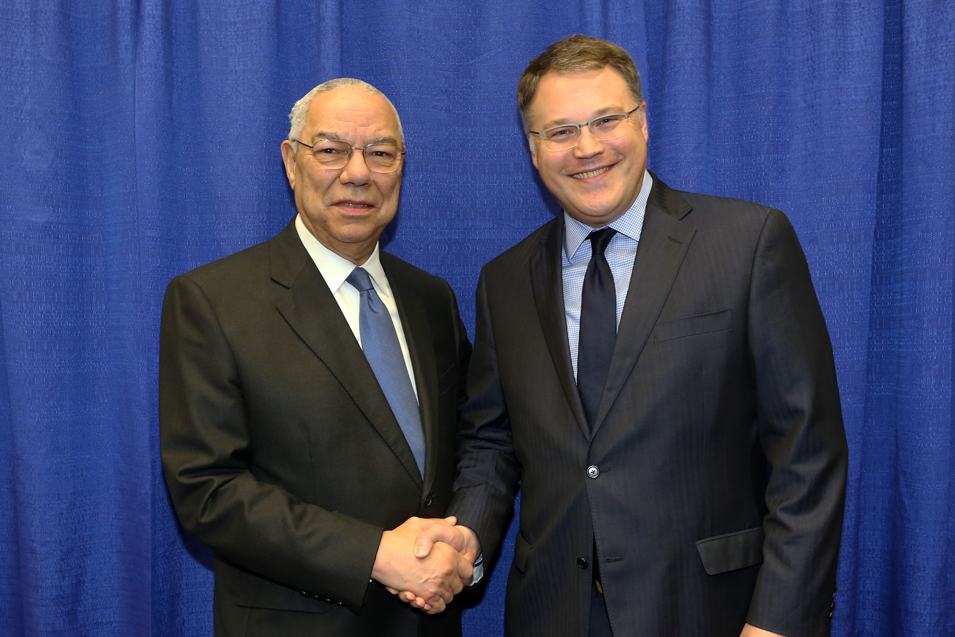
The year was 1963. The conflict between North and South Vietnam was raging and walking through the forest with a Vietnamese infantry battalion was a young Army lieutenant, serving as a U.S. adviser to the South Vietnamese Army.
The Viet Cong ambushed their party, bullets whizzing through the trees. They returned fire, and drove back the assault, but not before one soldier perished.
“That night as I tried to sleep on the forest floor,” the young lieutenant wrote years later about his first time under fire, “I was filled with the realization that the next morning we would probably be ambushed again. And we were.”
“That morning and every morning, I had to use my training and self-discipline to control my fear and move on … I could not let my fear control me.”
Colin Powell died last month of complications from COVID-19. And when I heard the news I felt a sense of loss, not because I knew him – I had the thrill of meeting him just once – but because I have always admired him as a public figure, as a professional, and as a person.
Master of a Lost Art
At the same time, I struggled to articulate why I so admired him. To be sure, the obituaries and opinion pieces recounted all of the firsts in his storied career: the first Black national security adviser, the first Black chairman of the Joint Chiefs of Staff, and the first Black secretary of state.
As Theodore Johnson observed in the New York Times, “Mr. Powell demonstrated how to move in rooms of power and how to manage the pressure that came with it.”
But he didn’t always get it right, most memorably in his 2003 speech to the United Nations Security Council making the case that Iraq had weapons of mass destruction. When no weapons were found, his reputation took a big hit.
The only thing I know I had in common with Colin Powell – and that most of you do, too – is that we both received undergraduate degrees in geology.
“The entire (geological) profession should be relieved that I chose a different vocation,” quipped Powell, during the 2017 NAPE Charities Luncheon, as a friend reminded me. I think I got that quote right.
Powell also insisted, however, that his study of geology served him well throughout his career, whether moving troops across difficult terrain as a soldier or dealing with intricacies of petro-diplomacy as a statesman.
The source of my admiration for Powell, it became apparent to me, is that despite his high-flying and public career, amid all his successes and particularly his failures, he showed himself to be a real person, rather than a caricature. He had obviously cultivated the adult skill of holding seemingly opposing thoughts in his head, wrestling and trying to reconcile them. That’s a lost art these days, particularly in the public sphere.
I like to think that those are the same skills we use as geologists to solve problems, taking disparate, often conflicting information and making sense of it. He might have been pretty good at our vocation after all.
A Legacy of Leadership
The story I opened with illustrates Rule 12 of Powell’s 13 Rules for Leadership from his book, “It Worked for Me,” which is, “Don’t take counsel of your fears or naysayers.”
When confronting the messy situations that life throws at each of us, where the path forward isn’t clear, you have to confront both fear and naysayers.
“Naysayers are everywhere,” Powell explains. “They feel it’s the safest position to be in. It is the easiest armor to wear …” Don’t disregard them, as both fears and naysayers offer opportunities for learning. They may be right, but just as easily they may not be. “Each of us must work to become a hardheaded realist.”
He concludes his list of rules with No. 13: “Perpetual optimism is a force multiplier.”
As you’re navigating life’s difficulties, as you’re grappling with fear and the naysayers, there is something you can do to give yourself an advantage, and that is manage your attitude about what you’re experiencing. This isn’t necessarily easy, but it is simple.
“Perpetual optimism, believing in yourself, believing in your purpose, believing you will prevail, and demonstrating passion and confidence is a force multiplier,” Powell writes.
I can use this reminder as this year draws to a close – to remain steadfast, to focus on the goal, and to use our fears and the naysayers to make better decisions, and to move ahead boldly with optimism.
Celebrating the Thanksgiving holiday here in the United States this month, I am thankful for the life of Colin Powell. I am inspired by his accomplishments and dedication to principles and ideals much larger than himself. His is a legacy to which we can all aspire.